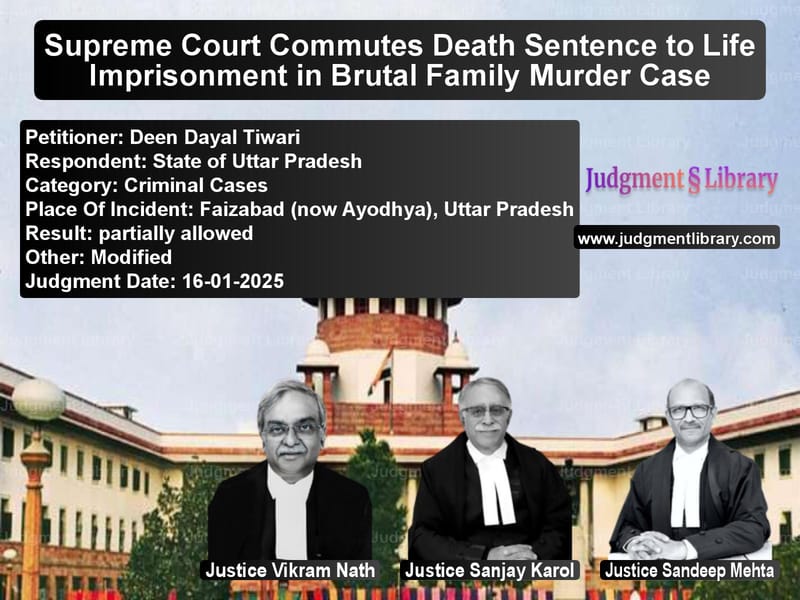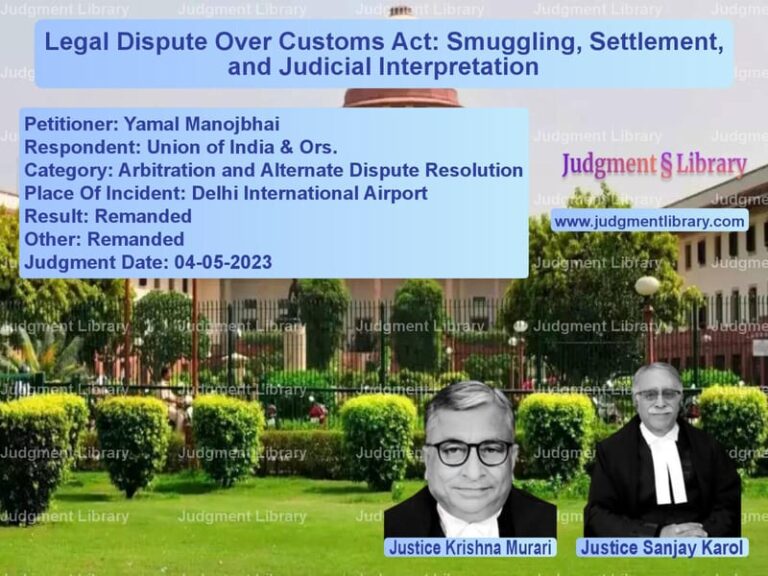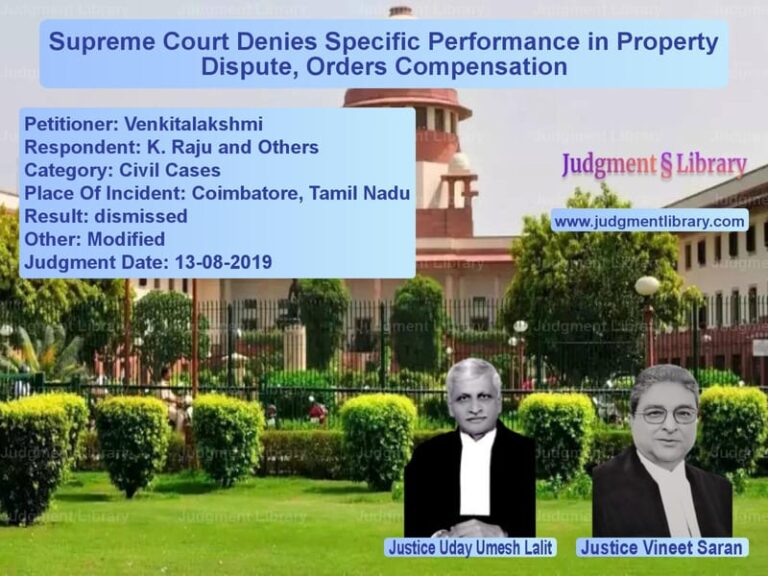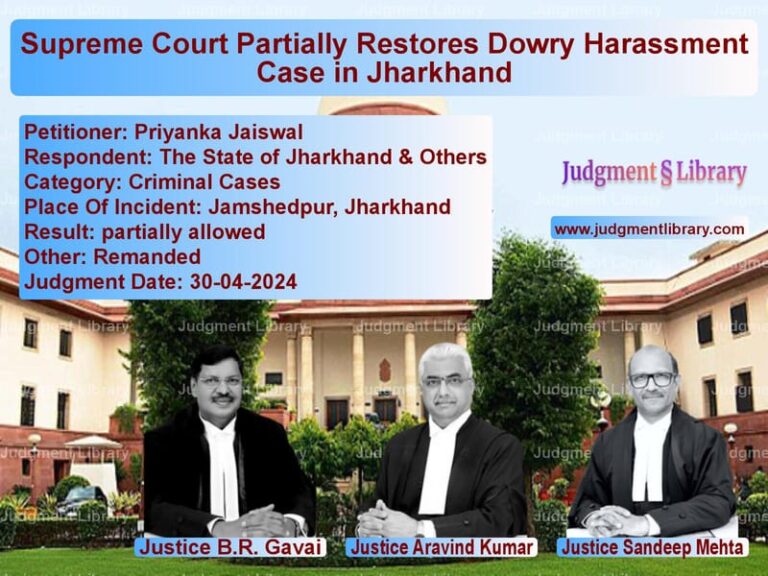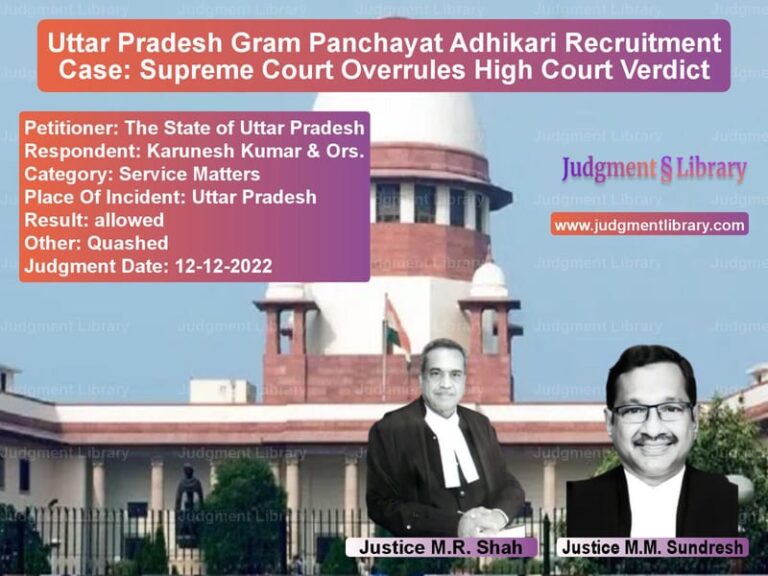Supreme Court Commutes Death Sentence to Life Imprisonment in Brutal Family Murder Case
In a landmark judgment, the Supreme Court of India commuted the death sentence of Deen Dayal Tiwari, who was convicted of murdering his wife and four minor daughters in the district of Faizabad (now Ayodhya), Uttar Pradesh. The case, which was based entirely on circumstantial evidence, led to extensive legal debates over the severity of punishment and the scope for reformation of the accused.
Background of the Case
The case stems from an incident on the intervening night of November 11-12, 2011, when cries of ‘bachao-bachao’ were heard from the house of the accused, Deen Dayal Tiwari. His brother, PW-1 (Dinanath Tiwari), and his wife, PW-2 (Suneeta alias Anita), tried to enter the house but found the door locked from inside. They claimed to have seen the accused emerge briefly, holding a blood-stained axe, warning them to stay away before retreating inside and locking the door again.
PW-1 lodged a formal FIR (Case Crime No. 748 of 2011) at the local police station at around 6:10 AM on November 12, 2011. When police reached the scene, they found the accused inside his locked house with his wife and four daughters lying dead in pools of blood. The accused was immediately arrested, and a blood-stained axe was seized from him. Upon further investigation, two knives were also recovered from the crime scene.
Trial and Conviction
The trial was conducted in the Court of Additional District & Sessions Judge, Court No. 5, Faizabad, where the prosecution presented the case primarily based on circumstantial evidence. The prosecution relied on the testimonies of:
- PW-1: The accused’s brother, who reported the incident and claimed to have seen the accused with a blood-stained axe.
- PW-2: PW-1’s wife, who corroborated the claims of hearing cries and seeing the accused.
- PW-3: An independent witness who arrived at the scene after receiving a call around 2:30 AM.
- PW-4: Dr. S.K. Shukla, who conducted the postmortem and confirmed the use of sharp-edged weapons in the murders.
- PW-5: Investigating Officer Ajay Prakash Mishra, who led the police team that arrested the accused and recovered the weapons.
The trial court, on January 30, 2014, convicted the accused under Section 302 of the Indian Penal Code and sentenced him to death, declaring it a case that fell under the ‘rarest of rare’ category.
Arguments Presented in Appeal
The case was appealed before the High Court of Allahabad (Lucknow Bench), where the defense argued that the conviction was solely based on circumstantial evidence. The key arguments made were:
Arguments by the Petitioner (Appellant – Deen Dayal Tiwari):
- Lack of Direct Evidence: The petitioner argued that there was no eyewitness to the murder, and the entire case was based on circumstantial evidence.
- Contradictions in Testimonies: The defense highlighted inconsistencies in the testimonies of PW-1, PW-2, and PW-3 regarding the sequence of events.
- Fabricated FIR: The appellant contended that the FIR was lodged after his arrest but was falsely recorded at 6:10 AM.
- Inadmissible Confession: The accused’s alleged confession to the police was challenged as inadmissible under Sections 25 and 26 of the Indian Evidence Act.
- Possibility of Alibi: The accused claimed he was sleeping in the barn at the time of the incident, and unknown assailants had committed the murders.
- Unreliable Forensic Evidence: The defense questioned the lack of a serological report linking the blood stains on the recovered weapons to the deceased.
Arguments by the Respondent (State of Uttar Pradesh):
- Strong Circumstantial Evidence: The prosecution maintained that the chain of circumstances clearly pointed to the accused’s guilt.
- Accused Found at the Crime Scene: The accused was found inside the locked house with a blood-stained axe, and the five victims lay dead.
- Corroboration of Postmortem Findings: The medical evidence confirmed that the injuries matched the weapons recovered.
- Brutality of the Crime: The prosecution emphasized the heinous nature of the crime, arguing that the accused mercilessly killed his own wife and daughters.
The High Court upheld the conviction and confirmed the death sentence.
Supreme Court Judgment
The case was then appealed to the Supreme Court, where the Bench comprising Justices Vikram Nath, Sanjay Karol, and Sandeep Mehta reconsidered the appropriateness of the death sentence.
The Court observed:
- “While the crime committed is of extreme gravity, the test of ‘rarest of rare’ must be applied judiciously.”
- “The petitioner does not have a history of criminal activity, and reports suggest a possibility of reformation.”
- “A life sentence without remission serves the interests of justice while allowing room for reformation.”
Taking these factors into account, the Supreme Court commuted the death penalty to life imprisonment for the entire natural life of the convict without the possibility of remission.
Conclusion
The Supreme Court’s ruling highlights the evolving stance on capital punishment in India, emphasizing that the death penalty should be reserved for cases where no alternative punishment is viable. While the severity of the crime was acknowledged, the possibility of reform played a crucial role in the final judgment.
By commuting the death sentence to life imprisonment, the Court reinforced the principle that justice must be tempered with fairness, even in the most heinous of crimes.
Petitioner Name: Deen Dayal Tiwari.Respondent Name: State of Uttar Pradesh.Judgment By: Justice Vikram Nath, Justice Sanjay Karol, Justice Sandeep Mehta.Place Of Incident: Faizabad (now Ayodhya), Uttar Pradesh.Judgment Date: 16-01-2025.
Don’t miss out on the full details! Download the complete judgment in PDF format below and gain valuable insights instantly!
Download Judgment: deen-dayal-tiwari-vs-state-of-uttar-prade-supreme-court-of-india-judgment-dated-16-01-2025.pdf
Directly Download Judgment: Directly download this Judgment
See all petitions in Murder Cases
See all petitions in Bail and Anticipatory Bail
See all petitions in Judgment by Vikram Nath
See all petitions in Judgment by Sanjay Karol
See all petitions in Judgment by Sandeep Mehta
See all petitions in partially allowed
See all petitions in Modified
See all petitions in supreme court of India judgments January 2025
See all petitions in 2025 judgments
See all posts in Criminal Cases Category
See all allowed petitions in Criminal Cases Category
See all Dismissed petitions in Criminal Cases Category
See all partially allowed petitions in Criminal Cases Category

